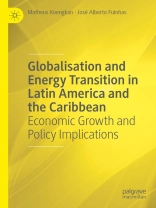This book explores the potential for renewable energy development and the adoption of sustainable production processes in Latin America and the Caribbean. By examining the energy transition process, the impact of environmental degradation, and the relationship between renewable energy sources and economic growth, the effects of increased globalisation and liberalisation in this part of the world are analysed. Particular attention is given to renewable energy investment, the energy-economics growth nexus, the impact of trade openness, and the mitigation of carbon emissions.
This book aims to highlight econometric techniques that can be used to tackle issues relating to globalisation, the energy transition, and environmental degradation. It will be relevant to researchers and policymakers interested in energy and environmental economics.Innehållsförteckning
1 Introduction.- 2 Renewable Energy Transition and Globalisation in the Latin American and Caribbean Region: A Five-Decade Picture.- 3 Does Financial Openness Expand the Renewable Energy Investment in Latin American Countries?.- 4 The Interactions Between Renewable Energy Consumption, Economic Growth, and Globalisation: Fresh Evidence from the Mercosur Countries.- 5 The Energy-Economic Growth Nexus in Latin American and Caribbean Countries: A New Approach with the Globalisation Index.- 6 Impact of Trade Openness on the Consumption of Fossil Fuels in Latin American and Caribbean Countries.- 7 The Role of the Globalisation Process in Mitigating Carbon Dioxide Emissions in Latin American and Caribbean Countries.- 8 Does the Energy Transition Process Decrease the Environmental Degradation in Latin American and Caribbean Countries? .- 9 Conclusions
Om författaren
Matheus Koengkan holds a Ph D in economics from the University of Évora. He is an energy and environmental economics researcher at the Department of Economics, Management, Industrial Engineering and Tourism (DEGEIT), University of Aveiro, Aveiro, Portugal.
José Alberto Fuinhas, Ph D in economics, is a professor of monetary economics and intermediate econometrics at the Faculty of Economics of the University of Coimbra, Coimbra, Portugal. In addition, he is a researcher of macroeconomics, energy economics, and environmental economics at the Ce BER – Centre for Business and Economics Research












